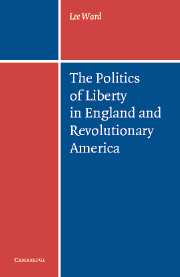PART ONE - THE DIVINE RIGHT CHALLENGE TO NATURAL LIBERTY
Published online by Cambridge University Press: 28 October 2009
Summary
Robert Filmer is usually remembered by posterity, if at all, as the ideological and philosophical nemesis of early English Whigs, most notably James Tyrrell, Algernon Sidney, and John Locke. There is, however, much more to Filmer's thought than what is suggested by the charred remains left to history by his polemical mauling at the hands of the Whigs. On one level, Filmer is conspicuous as the direct target of attack for the Whigs. In the minds of many Whigs, Filmer's work embodied all too clearly everything that was mistaken and dangerous in English royalism. For this reason alone, Filmer is an important figure in the development of early modern political thought. In order to understand the first Whigs and their intellectual descendants, the serious student of the period must pay careful attention to Filmer. However, Filmer should be regarded as more than just a hapless polemical foil for his more talented Whig antagonists. As we shall see, Filmer's arguments for divine right monarchy and political absolutism in the turbulent years from the 1630s to the 1650s provided the intellectual nerve of the mainstream royalist and Tory position in England well into the eighteenth century. Filmer's passionate and articulate defense of the principles of passive obedience, indefeasible hereditary right, and royal supremacy echoed through much of the Tory literature at the time of Exclusion and well beyond.
- Type
- Chapter
- Information
- Publisher: Cambridge University PressPrint publication year: 2004



